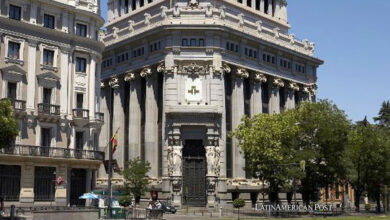Nicaragua wants to be like Venezuela using social reforms
 Despite the relative stability of Nicaragua, the malaise generated by the economic reforms, the censorship of press freedom and the increasing non-conformity with the guidelines of national policy begin to give indications of a crisis that could be assimilated with the Venezuelan one
Despite the relative stability of Nicaragua, the malaise generated by the economic reforms, the censorship of press freedom and the increasing non-conformity with the guidelines of national policy begin to give indications of a crisis that could be assimilated with the Venezuelan one

The social insurance reforms promoted by the government of President Daniel Ortega, which sought to increase the percentage of contributions and reduce the amount of contributions to retirement (affecting the workers and the private sector), had as a consequence the angry protests and nonconformity in Nicaragua that were the focus of attention for the international press. Despite the announcement about the cancellation of these reforms, the nonconformity does not seem to subside.
Leer en español: Nicaragua quiere parecerse a Venezuela usando reformas sociales
Nicaragua has been characterized as one of the safest countries, reputed to be one of the least violent countries, and for maintaining levels of economic growth in Central America. However, the current violence begins to question the label of one of the safest countries in Latin America, and the percentage of poverty in that country is very high according to figures from the World Bank.
The economic opening, the increase in foreign investment, and the prospects for economic growth are not reflected in the increase in the quality of life of its citizens. Nicaragua continues to be one of the least developed countries in Latin America: the difficult access to basic services, the questionable electoral results in past elections, the growing censorship of the media that is beginning to generate dictatorship, the prohibition of abortion in any case, and the rapidity with which grows the economic capital of the president and his close circle, were a breeding ground for the protests we are currently observing to generate. But the last drop was the reform generated from the National Institute of Social Security.
Social and economic issues begin to be affected by the repercussions on security and foreign investment issues, which are the main pillars that have allowed Nicaragua to excel in the region.
This situation recalls a little, although on a smaller scale, the one experienced by Venezuela. Keeping distance from the cases, the constant and harsh demonstrations, the high number of dead results, the complaints about human rights violations, a large number of dissatisfied citizens and looking for the executive to abdicate and the elites to be enriched to great speed shows a degree of similarity between the situation of countries and their crises.
For Nicaragua, the main concern in a short and medium term is that the economy is affected by the social situation in the country. The President of the Superior Council of Private Enterprise, José Adán Aguerrí, was right when he said: "Here is a situation that has a huge impact, and the results, beyond the millions of dollars in losses (by looting and vandalism), they will be seen in the following months". What Aguerrí refers to, is that foreign investment can be reduced, which amounted, in 2017, 1,500 million dollars.
On the other hand, the demonstrations do not stop despite the withdrawal of the social security reform. According to figures from the Permanent Commission on Human Rights in Nicaragua, 15 people have disappeared and about 63 people have died, very different data presented to the government, which records only 10 deaths. Faced with the acts of abuse of power by the security forces, activists and human rights defenders have filed complaints against the president, the vice president (wife of Daniel Ortega) and the head of the National Police.
To get to the case of Venezuela, Nicaragua should fall IGNORE INTO a great economic crisis as it had in 1986. It was precisely at this time, when Daniel Ortega took possession for the first time, under Sandinismo, as president. It was there when several private companies were nationalized, an expansive monetary policy was implemented and a large amount of money was printed, causing hyperinflation, whose only cure was the change of currency and the implementation of a different government in 1990.
In opposition to his past government, Ortega has changed the way he sees politics and how to implement them. Characteristics such as the economic opening of the country, cheap labor, the implementation of Special Economic Zones, special taxes for foreigners and their free trade agreements with the United States (on issues of chocolate, coffee, and bananas) show that Nicaragua is a attractive for companies from other countries to invest and their economy is not stagnant.
For this country, it is essential to resolve the nonconformity generated by the rapid economic growth of the country's elites, an unjust regulation of taxes and contributions to social security and laws against opponents and freedom of the press. For this purpose, it seems to begin to highlight the role of the church, teachers and some political leaders to set up a dialogue table and that this conflict does not trigger something more serious, a situation that millions of Venezuelans currently experience.
Latin American Post | Juan Sebastián Salguero
Translated from "Nicaragua quiere parecerse a Venezuela usando reformas sociales"

 Despite the relative stability of Nicaragua, the malaise generated by the economic reforms, the censorship of press freedom and the increasing non-conformity with the guidelines of national policy begin to give indications of a crisis that could be assimilated with the Venezuelan one
Despite the relative stability of Nicaragua, the malaise generated by the economic reforms, the censorship of press freedom and the increasing non-conformity with the guidelines of national policy begin to give indications of a crisis that could be assimilated with the Venezuelan one



